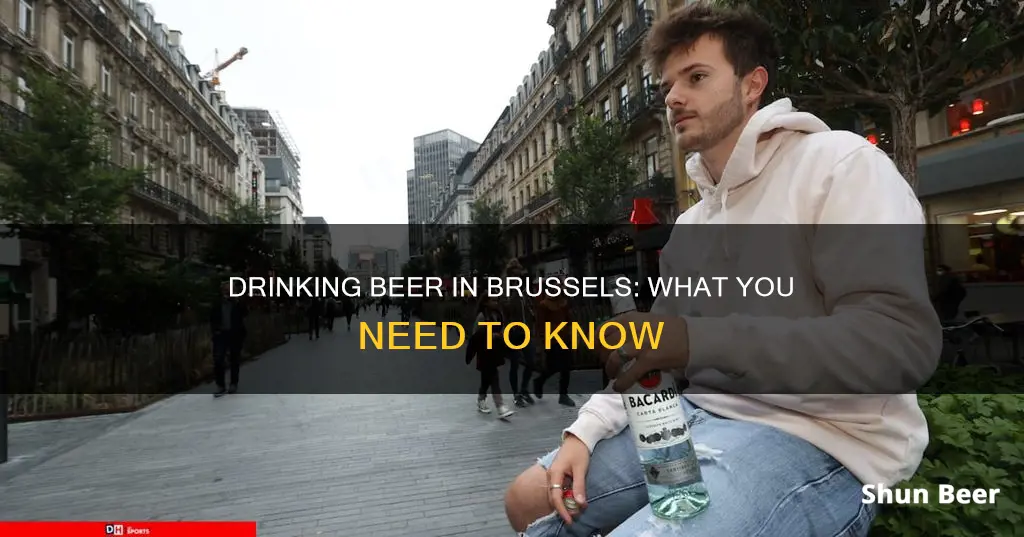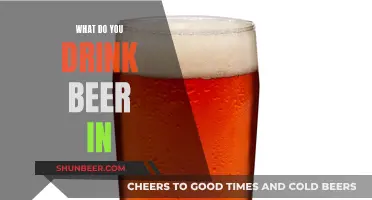
Drinking in public has been banned in the centre of Brussels until 6 October 2025. The ban was first instituted in February 2020 to curb public order issues and promote safety in pedestrian areas. It has since been extended multiple times, and now applies 24/7, with exceptions for events and outdoor terraces. The ban has been enforced to reduce public space damage, littering, and noise complaints. However, the rules vary across different neighbourhoods and municipalities in Brussels. While some neighbourhoods have implemented alcohol bans across their entire territory, others have limited the ban to specific areas or streets.
What You'll Learn
- Alcohol consumption in public spaces is banned in Brussels city centre until 6 October 2025
- Drinking is allowed at events and on terraces with a license
- Drinking in public was banned in Brussels to curb public order issues and promote safety
- The ban has been extended to 24 hours a day, seven days a week
- Alcohol bans are imposed via a police ordinance, accompanied by a clear reason for the decision

Alcohol consumption in public spaces is banned in Brussels city centre until 6 October 2025
Alcohol consumption in public spaces is banned in Brussels' city centre until 6 October 2025. The ban applies to a large part of the city centre, 24 hours a day, every day of the week. The ban includes all alcoholic drinks, whether distilled or fermented, and regardless of quantity. Alcohol can only be consumed on licensed terraces and at events authorised or organised by the City of Brussels.
The maximum fine for violating the alcohol ban is 500 euros, with repeat offences within two years resulting in increased fines that cannot exceed 500 euros. The ban was first instituted in February 2020 and has been extended several times, with the most recent extension taking it until October 2025. The ban aims to improve public safety, reduce public disorder, and curb violent behaviour in the city centre. It has also been reported to have positive knock-on effects, such as reducing public space damage, littering, and noise complaints from residents.
While the alcohol ban applies to a large part of the city centre, it is important to note that it does not cover all areas of Brussels. Some neighbourhoods have implemented their own bans on alcohol consumption in public places, while others have expressed opposition to such measures. The issue of public drunkenness and alcohol-related nuisances is being discussed by the mayors of the 19 Brussels municipalities, with a majority reportedly in favour of harmonising the regulations.
It is worth noting that the alcohol ban in Brussels does not prohibit drinking inside restaurants, bars with terraces, or open-air events in the central area. The focus of the ban is on public spaces and reducing the negative impacts of alcohol consumption in those areas. As always, it is important to drink responsibly and follow the local laws and regulations regarding alcohol consumption.
Please note that legal information can rapidly become out of date, and you should not rely on this as your sole source of information.
Beer and Eczema: Is There a Connection?
You may want to see also

Drinking is allowed at events and on terraces with a license
Drinking in public places in Brussels is banned in a large part of the city centre, 24 hours a day, until 6 October 2025. This ban includes alcoholic drinks of any quantity, whether distilled or fermented, or mixed. However, drinking is permitted on terraces with a license and at events authorised or organised by the City of Brussels. This exemption for licensed venues and events means that drinking is allowed in certain controlled spaces.
The alcohol ban in Brussels aims to address public order issues and promote safety in pedestrian areas, particularly at night. It also seeks to reduce public space damage and littering. The policy has been extended multiple times since its implementation in February 2020, and authorities plan to continue enforcing it to improve the quality of life for residents and pedestrians in the city centre. The ban has shown positive results in reducing litter and noise complaints, according to a report by the Brussels-Capital-Ixelles police department.
While drinking is permitted on licensed terraces and at authorised events, it is important to note that the sale and consumption of alcohol are still regulated. Licensed establishments must adhere to specific guidelines and regulations to ensure responsible alcohol service. These regulations may include restrictions on the hours of sale, the amount served, and the age of the patrons. Additionally, the City of Brussels may have specific requirements or conditions for events where alcohol is served to maintain order and safety.
As a visitor or resident of Brussels, it is essential to be mindful of the alcohol regulations and respect the licensed venues and authorised events that allow drinking. By following these rules and being considerate of others, individuals can enjoy their drinks responsibly while contributing to a safer and cleaner city environment. The City of Brussels is committed to striking a balance between allowing individuals to enjoy alcoholic beverages and maintaining public order and safety for all residents and visitors.
Beer and Vodka: Mixing Alcohol Safely
You may want to see also

Drinking in public was banned in Brussels to curb public order issues and promote safety
The decision to ban drinking in public was made by the authorities in Brussels to address issues related to public order and safety in the city centre. The policy aims to reduce public disorder, violent behaviour, and the number of public gatherings. It also seeks to improve the quality of life for residents by reducing noise complaints and littering. The ban has been extended to cover 24 hours a day, every day of the week, to further enhance the safety and cleanliness of the city centre.
While the drinking ban applies to public spaces, it does not include licensed outdoor terraces or events within the specified zone. This means that restaurants, bars, and cafes with outdoor seating areas are exempt from the ban, as long as they have the necessary licenses. Additionally, special events or gatherings authorised or organised by the City of Brussels are also excluded from the ban.
The ban on drinking in public has had mixed reactions from the mayors of the 19 Brussels municipalities. While some support it, citing the need to maintain harmony across all municipalities, others believe it is disproportionate to the issues at hand. They argue that a general alcohol ban would impact the freedom of citizens in areas where there are no problems.
To enforce the drinking ban, law authorities can issue fines of up to 500 euros for violations. Repeat offenders within two years can face doubled fines, but the total amount will not exceed 500 euros. The police can also intervene and confiscate alcoholic drinks from individuals consuming them in public places, regardless of whether they are causing a nuisance or not.
Shanghai's Public Drinking Laws: Beer Allowed?
You may want to see also

The ban has been extended to 24 hours a day, seven days a week
The consumption of alcoholic drinks in public spaces in Brussels has been a topic of discussion and concern for some time. While Belgium is known for its beer culture, and drinking in public places is legal, there have been efforts to curb public drunkenness and alcohol-related nuisances, particularly in the city centre of Brussels.
In February 2020, the City of Brussels implemented a drinking ban in the city centre, initially intended to last for six months and only during the night-time hours from midnight to 6 am. This ban was put in place to address public order and safety issues, as well as reduce public space damage and littering. Fines for violating the ban were set at up to 350 euros, with the possibility of doubling for repeat offenders within two years.
Due to its perceived success, the drinking ban in Brussels has been extended multiple times. During the COVID-19 pandemic, the ban was extended to limit public gatherings, and in 2022, it was further extended until October 2023. With each extension, the ban's hours have also been expanded, and it now applies 24 hours a day, seven days a week. However, it is important to note that the ban does not prohibit drinking inside open-air events in the central area or on restaurant and bar terraces.
The 24/7 ban on drinking in public spaces in Brussels has had a notable impact on the quality of life in the city centre. Reports from the Brussels-Capital-Ixelles police department indicate a significant decrease in litter and bodily waste, as well as a reduction in noise complaints from residents. The fine for violating the ban has been increased to a maximum of 500 euros, providing further incentive for compliance.
While the ban has shown positive results, there are differing opinions among local authorities. Some municipalities, such as Watermael-Boitsfort, Anderlecht, and Uccle, have embraced the ban and enforced it across their entire territories. On the other hand, critics argue that a general alcohol ban is disproportionate to the issues and restricts the freedom of citizens in areas where there are no problems. As of September 2024, there is no concrete plan for a broader, city-wide ban, and the current ban is set to expire on 6 October 2025.
Beer and Sore Throats: Relief or Risk?
You may want to see also

Alcohol bans are imposed via a police ordinance, accompanied by a clear reason for the decision
Alcohol bans in Brussels are imposed via a police ordinance, accompanied by a clear and justifiable reason for the decision. Increased instances of nuisance related to alcohol consumption and public drunkenness are the main reasons for the imposition of alcohol bans in Brussels. The municipal council of Anderlecht, for instance, recently voted for a ban on its entire territory, and other communes are considering similar measures.
Alcohol bans are often temporary and limited to specific areas, which can be frustrating for police enforcement as people can simply move to another area to avoid being fined. Laurent Masset, spokesman for the Marlow police zone (covering Auderghem, Uccle, and Watermael-Boitsfort), supports a ban on the entire territory of the police zone, which would be easier to enforce. Some neighbourhoods in Brussels, such as Watermael-Boitsfort, Anderlecht, and Uccle, have already implemented general alcohol bans throughout their territories.
The City of Brussels has also extended its ban on drinking in public for another year, until October 2023, with the aim of making the city centre safer for pedestrians and residents. This ban applies 24/7 but does not include events and outdoor terraces. The policy has been reported to have positive effects on reducing public space damage, littering, and noise complaints from residents.
While more municipalities are expanding their alcohol-free zones, there is no concrete plan for a broader ban across all 19 Brussels municipalities. Some argue that a general alcohol ban is disproportionate to the issues and would have too great an impact on citizens' freedom. However, discussions are ongoing, and the topic was raised at the last conference of mayors, with a majority reportedly in favour of harmonising the regulations.
Skunked Beer: Is It Safe to Drink?
You may want to see also
Frequently asked questions
Drinking in public places is banned in most parts of Brussels city centre 24 hours a day. The ban was instituted to curb public disorder and promote safety in pedestrian areas.
Violation of the alcohol ban in Brussels is punished with a municipal administrative fine of a maximum of 500 euros. The fine is increased for repeat offenders within two years.
The alcohol ban does not apply to events and outdoor terraces authorised or organised by the City of Brussels. It also does not affect restaurants and bars with terraces.







